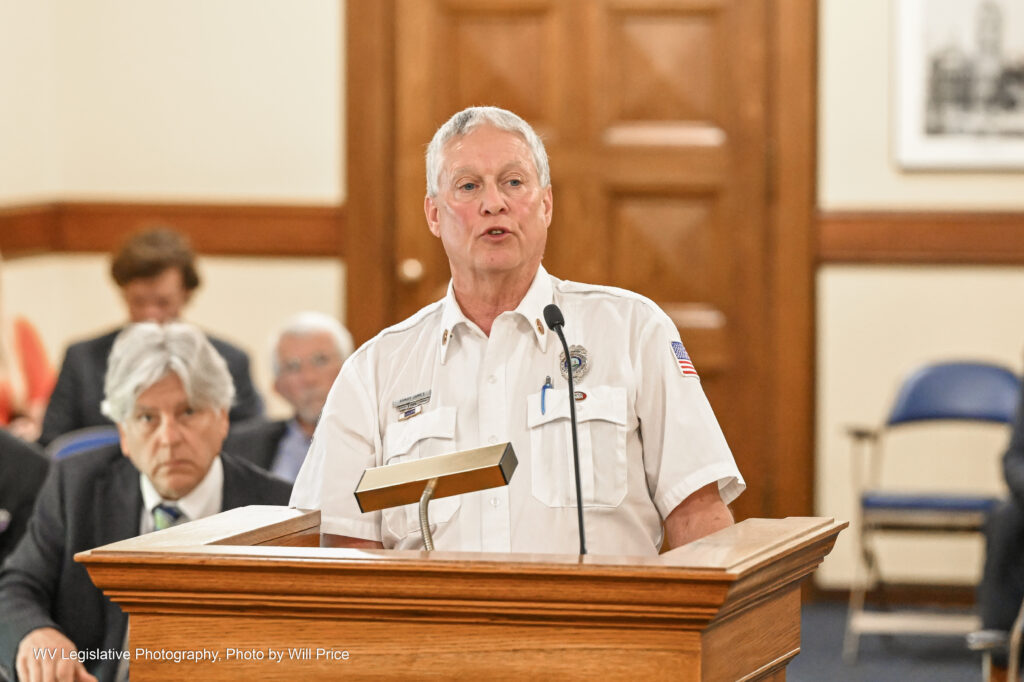W.Va. Biscuit Voted ‘South’s Best’
Tudor’s "Mountaineer” biscuit was named “The South’s Best Biscuit” in an online poll contest held by Garden & Gun, a southern lifestyle magazine.
Continue Reading Take Me to More News
State fire and EMS leaders face challenges with job recruiting and retention, keeping stations open and maintaining mental health in the wake of experiencing overwhelming tragedy. They are asking for help from the West Virginia Legislature.
Emotions ran high on Tuesday afternoon, as the Joint Committee on Volunteer Fire Departments and Emergency Medical Services heard stories of first responders’ continuing mental anguish in the aftermath of so many trauma response calls.
Jody Ratliff, the state Emergency Medical Services director, said a key to keeping people on the squads is addressing mental health issues. He said 988 Crisis Lifeline counselors are now working with traumatized EMTs and sending staff to ride along on serious ambulance calls.
Ratliff is also establishing regional critical debriefing teams throughout the state, responding when trauma and grief counseling are most needed.
“When there’s a major incident, we can deploy that team out to those areas, and they can actually do critical debriefing for it,” Ratliff said. “All these services, we’ve been able to pull off for free. So it’s not costing taxpayers a penny.”
Ratliff plans to eventually include firefighters in his trauma relief plans.
Randy James, the president of the West Virginia State Fire Chiefs Association, relates the dire funding woes of volunteer fire departments (VFDs) to mental health. James said new legislation gives VFDs the option to purchase a separate insurance policy to cover mental health issues for their members, but he added that it’s not working since it’s not affordable.
“As far as I know, I have not heard of a single fire department purchasing the extra insurance to cover PTSD for its members, they can’t afford it,” James said.
Joint committee members began the meeting by working to revitalize failed House Bill 3153, which would have markedly increased funding for volunteer fire departments and emergency medical services providers.
James told lawmakers if an EMS squad runs short of funds, they shut down. He said in 2022, 15 squads closed their doors. However, he said when VFDs lack funds, they lose volunteers.
“The departments will just keep doing what they do,” James said. “They cut back on services, maybe they don’t purchase as much equipment or they buy used equipment or even cut back on training. But one major thing that happens to a volunteer fire department when you don’t have adequate funding, is they lose members.”
James said it is aggravating to come away from legislative sessions with basically no increase in funding since 2005 while hearing the news about surplus funds and record tax collections. He asked the committee what else first responders can do to turn around 1,900 EMS vacancies with a workforce short by nearly a third.
Del. Joe Statler, R-Monongalia, echoed his fellow member’s sentiments when he said “don’t give up.”
“We know all the departments across the state are frustrated,” Statler said. “We hear when we’re back home, we hear from our local volunteer fire companies and EMS services. We are continuing to work on this problem that we have before us.”
Committee members said they would continue to make the failed funding bill better suited to passage. They plan to draft a letter to Gov. Jim Justice that the bill be included in any upcoming special session.
Fire and EMS Committee Chair Sen. Vince Deeds, R-Greenbrier, ended the interim meeting with a promise.
“As you can tell, everyone on this committee really is involved and engaged on all these issues,” Deeds said. “I give you my word, we’ll do everything we possibly can to get it right.”